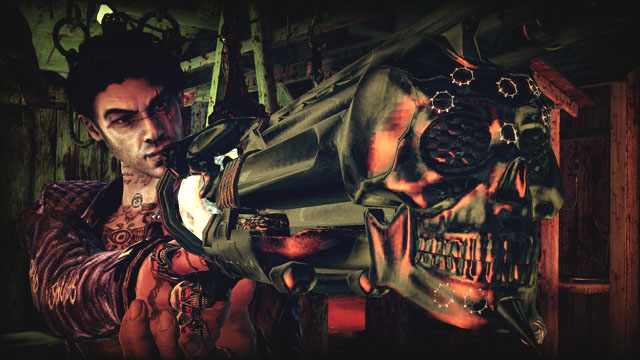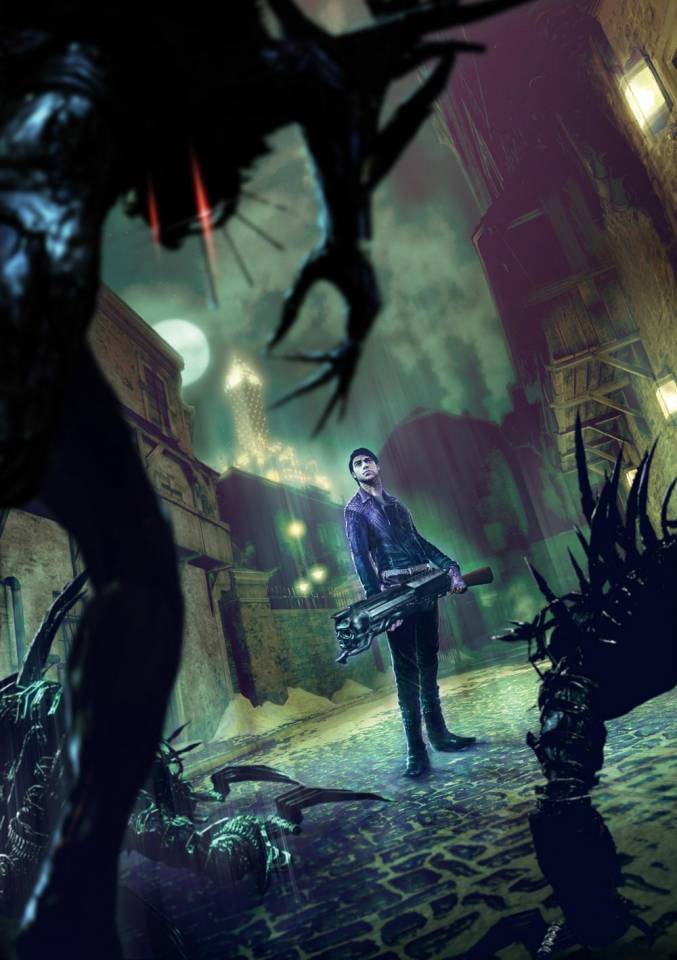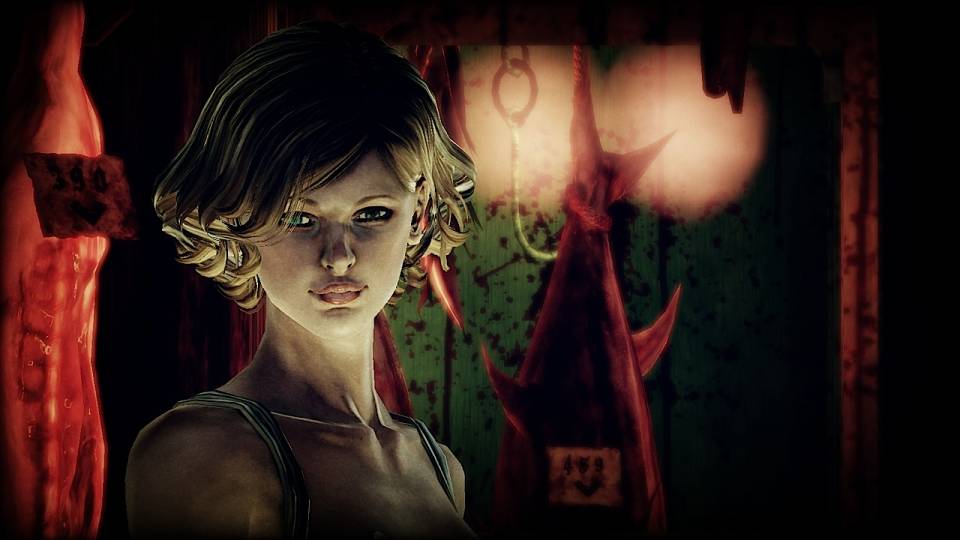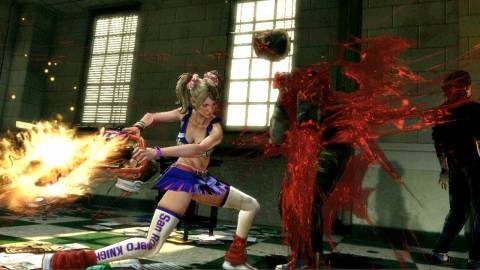
It should have been a home run.
Shadows of the Damned sold just 24,000 copies in North America when it was released in June. It doesn't matter how many copies it has or hasn't sold since; it's a tragedy when a trio of gaming's most creative minds out of Japan produce something terrific and the game fails to bring anyone out.

As the story often tragically goes, the collaboration between No More Heroes designer Suda 51, Resident Evil 4 mastermind Shinji Mikami and Silent Hill composer Akira Yamaoka was widely praised by critics. Electronic Arts did little to market the game, dooming it to word of mouth.
"I'm not satisfied with the sales," said Yamaoka in a recent email. "I'm proud of the project, so I'd like for a lot more people to play it."
You and me both, Yamaoka-san.
The project that eventually become Shadows of the Damned was announced in August 2008 at EA's annual summer event. Suda 51 and Mikami were both in attendance (Yamaoka was still working at Konami) to announce a collaboration with EA Partners for a horror game both of them would be working on. At the time, the game was even intended to be released on Wii. Obviously, that never happened.
EA, Epic Games and People Can Fly announced its partnership at the same event. Bulletstorm was released this past February.
Shadows of the Damned changed shape from when Suda 51 and Mikami conceived it while making Killer 7 at Capcom, and again over the course of development. Mikami and Suda 51 were aiming at Western audiences from the start, and signing with EA was seen as a way to reach that goal.
"Well, one of the reason for the, and I don’t know if I would call it restrained, but one of the reasons is our partnership with EA," Suda told me over email. "As a publisher, EA has been involved with Damned since the planning stages and their feedback has been invaluable. Damned has changed significantly since the first game design documents were created. And both Grasshopper and EA had the American and European markets in mind when we decided to make the game. Of course, we never once thought that we wanted to make a game that didn’t resonate with our Japanese audience also."
Suda pointed towards the decision to move onto Unreal Engine 3 was one of the reasons Shadows of the Damned underwent one of its stylistic changes, long before the public would actually see it.
Yamaoka was not part of the game's entire development. He left Konami in December 2009, having been the face of the Silent Hill series for years. Shadows of the Damned debuted for the first time at Tokyo Game Show in September 2010, less than a year after Yamaoka showed up. Even though the project had changed several times before he came on, he didn't look back.
"My focus was on the game we were creating when I joined," he said.

Like so many other of Yamaoka's projects, it's impossible to discuss Shadows of the Damned without mentioning its music. Music feels like little more than a checkbox in most games, but as with Silent Hill, Yamaoka's contributions help define the game. Shadows of the Damned is hardly a scary game, with a style heavily influenced by Sam Raimi's Evil Dead, but Yamaoka changes the game's mood on a dime, invoked by a eerie, shifting combination of music and sound effects.
Yamaoka described his work on Shadows of the Damned as "ethnic."
The composer is a player, too, and is constantly picking up the controller for influence.
"I think I spend more time playing the games than working on the music," he said.
His old habits have continued at Grasshopper, too. At Konami, Yamaoka was known for composing music at his apartment, a tradition that continued when he started working on Shadows of the Damned.
"I don't feel as creative when I'm at the office," he said. "In my home I have a studio with all of my personal equipment and it's more familiar. To me, making music isn't an extraordinary special activity. It's just like anything else you do in your home from cooking, to sleeping, or just relaxing; making music is the same. Your house is the place you're most comfortable, so it's the best place for me to create."
Shadows of the Damned is not a perfect game, but it exemplifies some of the best, craziest parts of Japanese creativity, something that's been largely lost in the transition to this generation. This problem is a source of great angst, an issue former Capcom designer Keiji Inafune railed against on a regular basis, telling Japan to evolve or perish to irrelevancy.
When Shadows of the Damned did arrive in stores in June, the game had been reworked several times, based on back-and-forth feedback between Grasshopper and EA.
"I created the original concept for Shadows of the Damned and the light and dark gameplay," said Suda. "I think I’ve rewritten the scenario for Damned at least five times!"
However long it took was worth the wait, unlike something else.
Shadows of the Damned arrived just after the release of Duke Nukem Forever, an ugly affair in which Duke experienced an old fashioned critical bloodbath. Duke Nukem Forever forced a whole generation of gamers to question their nostalgia. Was Duke ever really funny? What was I laughing at the whole time? Oh god, has my life been based on a terrible lie?
Shadows of the Damned's dick jokes were...legitimately funny. Okay, the "taste my big boner" part went on about 10 minutes too long, but if you were scared about the death of the dick joke, worry not. It turns out Duke Nukem Forever was missing a key ingredient: actual humor. We also have the 8-4 localization production house, who worked on the game, to thank.
Unfortunately, Suda passed on the opportunity to talk about this critical split. It's unclear whether Suda just doesn't know who Duke Nukem is (definitely possible) or didn't want to comment (also possible).
Players have been quick to throw EA under the bus regarding Shadows of the Damned's poor showing. EA featured the eccentric shooter at its press events, but in terms of wide advertising, the game felt blindly dumped at the end of the company's quarter, right alongside Alice: Madness Returns.
Suda, however, remained positive about the relationship.

"EA has given us feedback and support on many aspects of the project," he said. "There is a lot of mutual respect between EA and Grasshopper. Foremost in EA’s thinking was introducing Grasshopper to a global audience without losing the trademark style and attitude that has helped made us who we are today. We've been great partners."
It's unclear whether Grasshopper and EA will work together again. Warner Bros. will publish Lollipop Chainsaw, based on an idea from Suda and with music by Yamaoka. It sports a skirt-flashing cheerleader who moonlights as a zombie killer--and there's a head strapped to her gun.
Yep, sounds like a Grasshopper game.
Yamaoka said a Shadows of the Damned soundtrack will be available in early September.
The game will finally be released in Japan on September 22.
Thanks to the folks at 8-4 for making this happen. Listen to their podcast (mostly) about Japan, 8-4 Play, at http://www.8-4.jp.